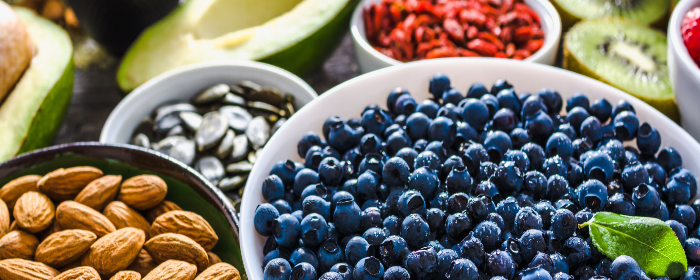
by admin | Nov 19, 2020 | Multiple Sclerosis, Health Awareness
While heat sensitivity in people with multiple sclerosis (MS) has been widely studied, the question of how cold weather affects patients still looms large. It was back in 1890 when optical issues (a common issue associated with MS) were linked to a rise in body temperature. More than a century later, MS patients still struggle to stay cool in the summer. As cooler weather approaches, however, the impending chill presents its own set of challenges.
Of course, winter introduces health issues even in people who aren’t affected by MS. Shorter days and increased darkness impact sleep patterns, which can ultimately lead to fatigue. Seasonal depression is also a common issue that emerges once the winter months descend.
Unfortunately, it appears that cold weather exacerbates MS symptoms. Specifically, pain, mobility challenges, fatigue, and depression seem to worsen. For one, the nerve damage caused by MS may be impacted by the winter weather, leading to spasticity and stiffness. Icy surfaces can also increase the risk of falls, making mobility challenges even more of a concern.
The “MS hug,” a feeling of pressure around the torso, becomes more pronounced for many patients in colder temperatures. Numbness and tingling may also worsen. Patients who experience Reynaud’s phenomenon, in which the blood vessels in the extremities narrow and cause discomfort, also report increased intensity in the winter.
Although there is still limited research on how cold weather impacts MS and why patients can still take certain measures to control symptoms throughout the winter months. Dressing in plenty of warm layers, eating warm foods, minimizing trips outdoors, and maintaining a moderate indoor temperature to reduce the shock when you do have to trek outside may help.
You might also consider discussing a supplement regimen with your specialist. Vitamin D levels often drop with decreased exposure to sunlight, so taking a daily vitamin could help to boost overall health and provide some relief for cold-related MS symptoms. Call a Stemedix Care Coordinator at 800-531-0831 and learn how our practitioner-grade supplements through Metagenics may help you and receive 10% off your first order!

by admin | Nov 10, 2020 | Health Awareness
“Superfoods” get their name from the powerful abundance of nutrients they pack, positioning them as some of the healthiest dietary choices one can make. Rich in the key vitamins, minerals, and macronutrients your body needs to perform its best, these foods offer outstanding nutritional value, allowing you to truly make your calories count. Here are a few to incorporate into your diet.
Carrots
Carotenoids, compounds linked to reduced risk and severity of inflammatory conditions, are found in many yellow, orange, and red vegetables. Yet, carrots have the lowest caloric density of all. Plus, they’re a cinch to prepare, whether you enjoy them in soups, salads, or just on their own as a snack.
Spinach
This leafy green powerhouse boasts high concentrations of omega-3 fatty acids and folate, nutrients which can reduce the risks of osteoporosis, stroke, and heart disease. The green is also an excellent source of lutein, which helps protect the eyes against macular degeneration, a leading cause of blindness.
Tomatoes
Red tomatoes are rich in lycopene, an antioxidant linked to a decreased risk of certain types of cancer and coronary artery disease. While fresh tomatoes are a good source of the nutrient, even processed tomatoes are high in lycopene, and the body may absorb it better. Consider incorporating ketchup, red sauce, and tomato juice into your meals.
Blueberries
Highly snackable, blueberries have the highest concentration of antioxidants of all North American fruit. They can help reduce cancer and diabetes risk, while fending off cognitive decline. Research even suggests they could boost cardiovascular health.
Oats
Oats are loaded with soluble fiber, which promotes feelings of satiety and helps to reduce heart disease risk. While most carbs tend to have a bad reputation, these are far from being nutritionally void like some other carb-heavy foods. The fiber helps to offset the sugar, and there is also a considerable portion of serving in each portion.
Black Beans
In general, beans support heart health. Black beans are the overachievers of the bean world, however. With anthocyanins, powerful antioxidants that enhance cognitive function, black beans support both brain and heart health. Plus, they’re a good source of protein while remaining relatively low in calories.
Walnuts
Many nuts have tremendous health benefits, but walnuts are among the best options. They’re rich in omega-3 fatty acids, which support heart health, and have a fair amount of protein. The polyphenols in the nuts also have anti-inflammatory properties.
For more health awareness articles, please visit stemedix.com/blog and search for “health awareness”.

by admin | Nov 4, 2020 | Health Awareness
Millions of Americans get sick from foodborne illnesses every year, and thousands die. Fortunately, there are steps you can take to prevent falling ill from food poisoning. While at home and dining out, here are seven ways you can minimize the risk of foodborne illness.
Avoid Cross-Contamination
Raw meat, fish, and poultry can have harmful bacteria. While it can be cooked out for safe consumption, it’s important not to allow these foods to come into contact with other, ready-to-eat foods or their handling environments. Store your meat and fish separately from your produce, both at home and while grocery shopping. Use different knives and cutting boards when handling produce versus meat or fish, and wash your hands in between.
Check the Package
Food that’s past its expiration date is more likely to get you sick. Be mindful of the dates listed on the packages for perishable items, including how many days you have to use products after opening them. If anything seems off, such as taste, texture, odor, or color, play it safe and dispose of it. Never eat anything from a package with a broken seal or bulging container, as this could indicate the presence of harmful bacteria.
Boost Kitchen Cleanliness
Always start meal prep with freshly washed hands. Even if you’re just having a quick snack, it’s always a good idea to kill any germs with warm water and soap, or hand sanitizer in a pinch. Disinfect your countertops regularly, and pop your sponge in the microwave for two-minute intervals to kill any bacteria.
Wash Your Fruit & Vegetables
Using a clean produce brush, thoroughly rinse any fresh fruit or vegetables before cooking or consumption. Never use any cleaning agents or soaps on food, however, as doing so could get you sick. Avoid washing poultry, meat, or eggs, as doing so could cause bacteria to spread.
Store Foods at the Proper Temperature
Keep your freezer at 0 degrees F, and your refrigerator at 40 degrees F. Always get perishable items in the refrigerator as soon as possible after coming home from the grocery store. Many condiments, such as mayonnaise, must also be refrigerated.
Be Cautious When Dining Out
Although restaurants must serve safe food to their patrons, missteps can still happen. Try to avoid any foods which could have raw egg, such as Caesar salad dressing, as the ingredient may harbor salmonella. Dine-in restaurants that have received satisfactory ratings from the board of health, and don’t eat anything that seems undercooked or spoiled. Make sure any leftovers are refrigerated within two hours to prevent them from spoiling.
Practice Road Trip Safety
If you’re packing perishable food for a long trip, be sure to keep it safely stored in a cooler with ice packs. Also, keep it in the cabin of the car with the air conditioning on if the weather is warm, instead of in the trunk.
To see more helpful health awareness blogs, please visit stemedix.com/blog.

by admin | Oct 28, 2020 | Health Awareness, Functional Medicine
Nutrition has long been a well-known factor in overall health, but only recently have researchers begun to uncover just how significant effect eating habits can have on the body. Certain habits, in particular, are linked with poor health outcomes, such as widespread illness. The Western diet is especially problematic.
According to the Dietary Guidelines for Americans, a startling percentage of the population is obese: nearly two-thirds of adults and one-third of children. This is likely due to a combination of factors, including an increased intake of processed foods, less exercise, and inadequate sleep.
These statistics are cause for concern, especially since diet-related health issues, including heart disease, high blood pressure, certain types of cancer, and type 2 diabetes are experienced by roughly half of the population. These chronic illnesses are serious, and in some cases, life-threatening.
Moreover, our diet directly influences our gut health, which plays a critical role in immunity. Thus, when we don’t have the proper balance of gut bacteria, we become more likely to get sick not only on a short-term basis but also later on.
The Trouble with the Western Diet
Research shows more than half of Americans’ daily caloric intake comes from heavily processed products. These foods have ingredients that can have a negative effect on health, including saturated and trans fats, added sugars, artificial sweeteners, and sodium. Examples include potato chips, white bread, frozen pizza, candy, sodas, and snack cakes. These foods are often chosen due to their convenience and affordability.
Yet, there’s a tradeoff: over the long-term, the body’s systems become affected by these eating patterns. For instance, a high-fat, high-sugar diet will reduce the number of healthy bacteria in the gastrointestinal tract, which can lead systems in the body such as the immune system to malfunction.
Hunter-gatherers, who get their sustenance from natural sources, have a far more diverse collection of microflorae than individuals who follow the Western diet. Without this healthy population of gut bacteria, individuals may be more likely to experience autoimmune conditions, in which the immune system misfires and mistakenly attacks its own healthy tissue.
If you want to find out exactly what your deficiencies and insufficiencies are to avoid any oncoming conditions, you will want to do a comprehensive functional medicine test. These are available to do simply at home and your results will show your exact health blueprint. Genova Diagnostics provides these tests and are available through Stemedix.
While research into the relationship between diet and autoimmune disease is ongoing, the following dietary changes can make positive impacts on your health and help you feel better:
- Eat more plant-based foods. Look for bread and pasta products made with whole grains, along with vegetables, fruits, and legumes.
- Reduce sugar and salt intake. Most Americans consume far too much sodium and sugar. Read the labels on packaged foods to make sure you’re not going over daily recommendations.
- Choose healthy fats. You don’t have to steer clear of fats altogether. In fact, there are health benefits to eating certain types, including monounsaturated and polyunsaturated fats. Aim to get healthy fats from sources such as nuts, seeds, and plant-based oils.
- Shop wisely. Not all processed foods should be off-limits, either. Just because the food comes in a package doesn’t make it a poor nutritional choice. When grocery shopping, choose foods that are nutrient-dense and have undergone minimal processing. Some options include yogurt, frozen fruits and vegetables, canned beans, nut butter, and hummus.

by admin | Oct 22, 2020 | Functional Medicine, Health Awareness
Genova Diagnostics is a global clinical laboratory offering exclusive diagnostics to help providers offer highly personalized treatment plans for their patients. With the insights retrieved from their testing, patients can optimize their health with fewer doctors’ visits, and some tests can be in the comfort of their own home. Their testing kits provide a personal health blueprint of your specific health concerns, including deficiencies or insufficiencies from a functional medicine standpoint. In particular, here’s a look into Genova’s innovative NutrEval Plasma and GI testing.
NutrEval Plasma Testing
Genova’s NutrEval Plasma testing assesses genomic markers to provide personalized insights for the most effective therapeutic approaches to a broad range of conditions, including chronic pain, cardiovascular disease, depression, anxiety, and inflammatory conditions. This testing is especially advantageous for patients experiencing undernutrition or obesity, but it can also show deficiencies in micronutrients for any individual. There are several conditions and symptoms that can occur when nutrients are out of balance, including fatigue, mood disorders, cardiovascular disease, weight issues, malnutrition, and diabetes.
Comprehensive nutrition is essential to disease prevention. Every cell in the body thrives on nutrients, so testing your deficiencies or insufficiencies can help you understand which imbalances you need to address. This helps to promote optimal functioning at a cellular level.
Genova’s functional nutritional assessment looks at a broad range of biomarkers, including metabolic analysis markers, amino acids, vitamin D, oxidative stress markers, and essential and metabolic fatty acids markers, among others. In doing so, it paints a comprehensive picture of a patient’s nutrition.
GI Effects Comprehensive Profile
Genova’s GI Effects test is a stool profile that provides immediate and actionable data to help providers promote optimal gastrointestinal wellness in their patients. It looks into the digestive function, inflammation, and the health of the microbiome.
Many health challenges are directly related to the health of the gastrointestinal tract. For example, indigestion, bloating, and gas can be a direct result of inflammatory bowel disease (IBD). Yet, it’s also suspected that many other diseases can result from an imbalanced gut microbiome. Assessing, and then addressing, gut health is therefore critically important to promoting overall wellness.
Genova offers a comprehensive assessment of gastrointestinal health, recovering live organisms, and looking into a vast array of biomarkers, such as inflammation, digestion and absorption, and the gut microbiome, among others. This then gives providers the information needed to guide strategic interventions.
Both of these Genova tests are only available through healthcare providers, like Stemedix. When a board-certified provider uses these blueprints to look into your overall wellness, they can promote effective treatments to optimize your health and energy. Genova also offers additional tests for hormones, environmental factors, and other realms of health to promote the most comprehensive possible approach to wellness.
Stemedix is excited to offer these exclusive diagnostics to their patients. We’re ready to help you start living your best, healthiest life. Ask us about Genova Diagnostic tests today!

by admin | Oct 15, 2020 | Health Awareness, Functional Medicine
Honey has long been hailed as a healthier alternative to refined sugar. But what exactly is it about this natural sweetener that makes it a better choice? Discover why you should consider adding the sweet stuff into your diet below.
Honey vs. Table Sugar
Raw honey contains trace amounts of key nutrients, including vitamins, minerals, proteins, and antioxidants, which lend themselves to honey’s higher nutritional value compared to granulated white sugar. It has natural antibacterial properties, thanks to the small amounts of hydrogen peroxide – a cleansing agent that is created in the hive when nectar is dehydrated. It’s, therefore, no surprise that honey has historically been used as a topical medicine for burns, ulcers, and other types of skin wounds.
Honey’s Healing Properties
Of course, honey’s use as an antibiotic fell to the wayside when modern antibiotics were introduced. Yet, researchers have begun to reassess the substance’s potential, looking into its possible applications for treating asthma, heart disease, fungal infections, inflammation, viruses, and gum disease, among other conditions. Future research will need to be conducted to determine dosing and efficacy, but it’s possible adding small amounts of honey into your regular diet could deliver some health-boosting benefits.
In particular, certain varieties of honey, such as manuka, are considered therapeutic kinds of honey. They help to minimize scar tissue and stimulate healing, and some traditional medicine practitioners even recommend them as a remedy for hangovers.
Honey is also commonly used as an ingredient for cosmetic products, as it can hydrate the hair and lubricate the skin. For this reason, honey works well in both commercial products, such as shampoos, lip balms, and facial scrubs, as well as home concoctions. Homemade honey-based face masks can leave the skin looking and feeling refreshed.
While people with high blood sugar or diabetes should be cautious about adding in new sources of carbohydrates such as honey, for most people, this natural sweetener offers plenty of benefits to consider.
If you are interested in learning more about a scientific option in finding what your direct deficiencies and insufficiencies are to potentially improve your overall health, please call a Care Coordinator about our home comprehensive tests at 727-456-8968 or submit a contact form today!







 St. Petersburg, Florida
St. Petersburg, Florida
